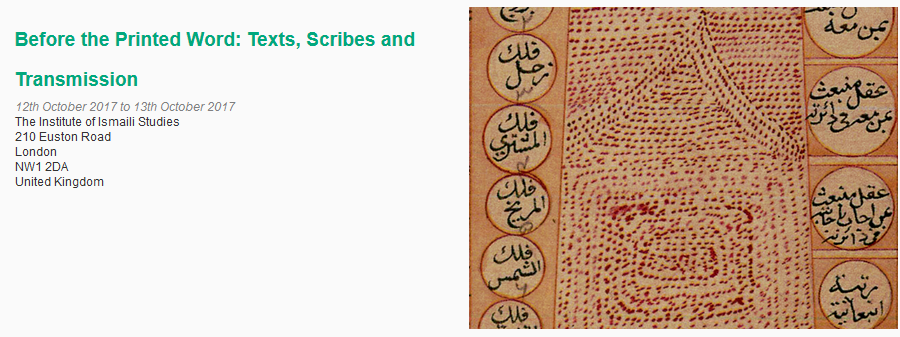
01 Oct Before the Printed Word: Texts, Scribes and Transmission
El Institute of Ismaili Studies acoge un simposio sobre las colecciones de manuscritos preservados en esta institución, bajo el título Before the Printed Word: Texts, Scribes and Transmission, que se celebrará los días 12 y 13 de octubre.
Será retransmitido por internet, de forma que se puede seguir bien de forma presencial, bien a través de este canal. Sea cual sea la forma elegida, es necesario realizar una preinscripción previa a través del siguiente enlace: http://iis.ac.uk/events/printed-word-texts-scribes-and-transmission.
Programa:
Before the Printed Word:
Texts, Scribes and Transmission
A Symposium on Manuscripts Collections Housed at the Institute of Ismaili Studies
Day one: Thursday, 12th October 2017
| 9:30 | Doors Open |
| 10:00 – 10:15 | Welcome Address
Farhad Daftary, The Institute of Ismaili Studies |
| 10:15 – 10:30 | The Work of Ismaili Special Collections Unit at the IIS
Wafi Momin, The Institute of Ismaili Studies |
| Panel 1: Manuscript Discoveries and their Impact on Ismaili Studies | |
| Chair: Carmela Baffioni, Accademia Nazionale dei Lincei/The Institute of Ismaili Studies | |
| 10:30 – 11:00 | Ismaili Manuscripts and Modern Scholarship in Ismaili Studies
Farhad Daftary, The Institute of Ismaili Studies |
| 11:00 – 11:30 | Husayn Hamdani, Paul Kraus, and a Suitcase Full of Manuscripts
François de Blois, University College London |
| 11:30 – 11:50 | Health break |
| Panel 2: Rasāʾil Ikhwān al-Ṣafāʾ and their Manuscript Culture | |
| Chair: Arzina Lalani, The Institute of Ismaili Studies | |
| 11:50 – 12:20 | The Ikhwān al-Ṣafā’s Epistles on Logic in Some Manuscripts of the IIS Collection
Carmela Baffioni, Accademia Nazionale dei Lincei/The Institute of Ismaili Studies |
| 12:20 – 12:50 | Manuscripts of the Epistles of the Pure Brethren (Rasāʾil Ikhwān al-Ṣafāʾ) in the Collection of the Institute of Ismaili Studies
Omar Alí-de-Unzaga, The Institute of Ismaili Studies |
| 12:50 – 13:00 | Group Photo |
| 13:00 – 14:00 | Lunch |
| Panel 3: Manuscript Study and Textual Analysis: The Early Ismaili and Fatimid Tradition | |
| Chair: David Hollenberg, University of Oregon | |
| 14:00 – 14:30 | The Kitāb al-Asrār Ascribed to the Fatimid Caliph al-Mahdī
Wilfred Madelung, The Institute of Ismaili Studies/University of Oxford |
| 14:30 – 15:00 | The Manuscript Copies of Abū Ḥātim al-Rāzī’s Kitāb al-Zīna at the Institute of Ismaili Studies
Cornelius Berthold, Hamburg University |
| 15:00 – 15:30 | The Manuscripts of the Fourth One Hundred of al-Majālis al-Muʾayyadiyya by al-Muʾayyad fi’l-Dīn al-Shīrāzī
Rachel T. Howes, California State University, Northridge |
| 15:30 – 15:50 | Health break |
| Panel 4: Traditions of Esoteric Interpretation in Central Asian Manuscripts | |
| Chair: Orkhan Mir-Kasimov, The Institute of Ismaili Studies | |
| 15:50 – 16:20 | The Pillars of Sharīʿa: An Ismaili Esoteric Interpretation
Yahia Baiza, The Institute of Ismaili Studies |
| 16:20 – 16:50 | Paying Homage to the Ahl al-Bayt: Shāh Ḍiyāʾī-yi Shughnāni’s Salām-nāma in Central Asian Manuscripts
Nourmamadcho Nourmamadchoev, The Institute of Ismaili Studies |
| 17:30 | Dinner (for presenters and chairs) |
Day two: Friday 13th October 2017
| Panel 5: Rethinking Ismaili History in Alamut times in Light of New Manuscript Discoveries | |
| Chair: Shafique Virani, University of Toronto | |
| 9:30 – 10:00 | Discovery, Description and Publication of Two Major Nizari Ismaili Manuscripts at the IIS: Dīwān-i Qāʾimiyyāt and the Haft Bāb of Ḥasan-i Maḥmūd-i Kātib
Jalal Badakhchani, The Institute of Ismaili Studies |
| 10:00 – 10:30 | ʿAhd-i Sayyidnā: A New Treatise on the Consolidation of Nizari Daʿwa in Alamut
Karim Javan, The Institute of Ismaili Studies |
| 10:30 – 11:00 | New Central Asian Ismaili Manuscripts on Ḥasan-i Ṣabbāḥ and the Sargudhasht-i Sayyidnā
Miklós Sárközy, Comenius University in Bratislava |
| 11:00 – 11:20 | Health break |
| Panel 6: Scribes, Phonology and the Satpanth Manuscript Culture | |
| Chair: Farouk Topan, The Aga Khan University | |
| 11:20 – 11:50 | A Forgotten Voice: Scribal/Literate Elite and the Satpanth Manuscript Culture
Wafi A. Momin, The Institute of Ismaili Studies |
| 11:50 – 12:20 | Garlands of Sounds (Varṇamālā): Establishing a Phonology of the Khojki Script
Shafique N. Virani, University of Toronto |
| 12:20 – 13:20 | Lunch |
| Panel 7: Colophons, Reading Culture and Fatimid-Tayyibi Manuscripts | |
| Chair: François de Blois, University College London | |
| 13:20 – 13:50 | Colophons of Ismaili Manuscripts
Ismail K. Poonawala, University of California, Los Angeles |
| 13:50 – 14:20 | The Majmūʿ al-Tarbiya between Text and Paratext: Exploring the Social History of a Community’s Reading Culture
Delia Cortese, Middlesex University London |
| Panel 8: Textual Transmission and Question of Identity in Central Asian Manuscripts | |
| Chair: Toby Mayer, The Institute of Ismaili Studies | |
| 14:20 – 14:50 | The Ṣaḥīfat al-Nāẓirīn: Reflections on Authorship and Confessional Identity in a Fifteenth-Century Central Asian Text
Daniel Beben, Nazarbayev University |
| 14:50 – 15:20 | Niʿmatullāhī Manuscripts in the Holdings of the Institute of Ismaili Studies
Orkhan Mir-Kasimov, The Institute of Ismaili Studies |
| 15:20 – 15:40 | Health break |
| Panel 9: Texts, Scribes and Transmission: Codicological Insights on Some Manuscripts housed at the IIS | |
| Chair: Sarah B. Savant, The Aga Khan University | |
| 15:40 – 16:10 | In the Making of a Signed Autograph Arabic Manuscript: Kitāb Naṣīḥat al-Ikhwān ʿan Shurb al-Dukhān
Walid Ghali, The Institute of Ismaili Studies and The Aga Khan University |
| 16:10 – 16:40 | The Qurʾan Manuscripts and their Contexts of Transmission: Marginalia and Commentaries in the Qurʾan Manuscripts housed at the IIS
Asma Hilali, University of Lille |
| 16:40 – 17:10 | Textual, Orthographic Variations and Scribes’ Annotations: A Possible Tool for the Transmission Analysis of the Text?
Monica Scotti, Independent Scholar |
| 17:10 – 17:45 | Concluding Remarks and Way Forward |
Información original:
Ismaili historiography has often lamented the destruction of renowned libraries developed under the Fatimids in Egypt (10th–12th centuries) and the Nizaris of Alamut times (11th–13th centuries). In many ways, this loss represented the eclipse of an important chapter in Muslim history that had witnessed the flourishing of learning and intellectual exchange across different societies. While it is hard to estimate with any certainty the extent of literary production engendered by this intellectual activity, or what was permanently lost in the wake of the destruction of these libraries, the surviving manuscript evidence points to a staggering wealth of textual material produced not only in Fatimid-Alamut times, but in other periods in Ismaili history too.
A significant body of this surviving material is now preserved at the Institute of Ismaili Studies, London (IIS) in a remarkable collection of nearly 3,000 manuscripts in Arabic, Persian and Indic languages. While the establishment of the IIS in 1977 gave the burgeoning field of Ismaili studies a major impetus, much of the manuscript material still awaits systematic research, discussion and publication. This was the primary drive behind a manuscript analysis project initiated by the IIS in 2014, a project established to accelerate the study of different aspects of the manuscript collection housed at the IIS.
The present symposium, the first of its kind organized by the IIS, aims to bring together scholars who have either contributed directly to the manuscript analysis project, or worked on the IIS manuscript repository or other similar manuscripts, to share their findings and insights. The papers in the symposium seek to bring into the study of manuscripts perspectives ranging from textual analysis and transmission, reading practices, scribal culture, codicological assessment and beyond.
To attend the event or view the live webcast, please ensure you pre-register by filling the event registration form.
Please note that this event will be photographed and recorded. By attending this event, you consent to photography, audio recording, video recording and their release by the IIS for marketing and promotional purposes.
For symposium programme, please click here.



No Comments